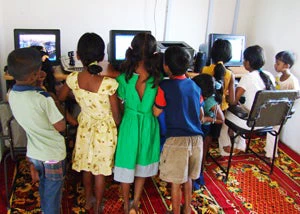
The internet is now an indispensible part of our lives for most of us. Whether it be checking email or Facebook or looking up something on Google or Wikipedia, we just can’t live without it (or at least, we feel that way!). However, it’s the way in which the Internet, by converging audio-visual, telecom, and computer networks into what we now call Information and Communications Technology (ICT), has made it easier for anyone with an idea or a dream to go out there and use these tools to create solutions, services, and products and create value, that makes it so powerful and empowering.
I can personally relate to this. When I came back to Sri Lanka in 2011 to ‘do my own thing’, I had an Excel sheet of possible business opportunities to work on but chose to first launch an online business, a group buying site, because of all the opportunities, it was the easiest, the cheapest, and the quickest to execute. The business didn’t succeed but, and get this, I was able to work on the model, build the platform, launch, gain some traction, then decide it wasn’t feasible in the long term, and shut it down, all within the space of five months. Try doing that with a brick and mortar business! I’m not being flippant here. A failed business is hardly optimum, but my point is that the ICT has lowered the cost of starting a business to such an extent that it allows people with great (or not so great!) ideas, but who would otherwise have been discouraged, to give these ideas a fair go. This risk-taking in turn fuels innovation, further lowering the barriers and creating a sort of virtuous cycle.
ICT also allows you to create value by solving problems in a radical way that may sometimes disrupt the existing status quo. The best example of this is AirBnB and the sharing economy/collaborative consumption model they seem to have triggered and the havoc it is creating in the traditional hotel industry. Closer to home, the startup that I currently run, Trekurious, is a good example of a more non-disruptive model. Trekurious solves a problem that people increasingly have (albeit a self-actualization type!) – that of finding and doing unique, interesting, and fulfilling experiential activities - by creating a platform to connect these people with others who are keen to share and monetize their considerable expertise and knowledge.
For anyone with that burning idea they’ve been meaning to work on, there has never been a better time to take the plunge. Use all the ICT tools we now have access to and go create value.


Join the Conversation